Unit 1基础英语
- 格式:doc
- 大小:109.50 KB
- 文档页数:12
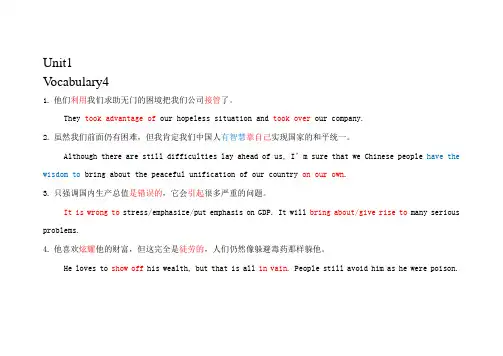
Unit1V ocabulary41.他们利用我们求助无门的困境把我们公司接管了。
They took advantage of our hopeless situation and took over our company.2.虽然我们前面仍有困难,但我肯定我们中国人有智慧靠自己实现国家的和平统一。
Although there are still difficulties lay ahead of us, I’m sure that we Chinese people have the wisdom to bring about the peaceful unification of our country on our own.3.只强调国内生产总值是错误的,它会引起很多严重的问题。
It is wrong to stress/emphasize/put emphasis on GDP. It will bring about/give rise to many serious problems.4.他喜欢炫耀他的财富,但这完全是徒劳的,人们仍然像躲避毒药那样躲他。
He loves to show off his wealth, but that is all in vain. People still avoid him as he were poison.5.他不久就爱上了这个村子。
他决心和村名一起把这个地方变成一个花园。
He soon fell in love with the village and was determined to make it a beautiful garden together with the villagers.6.我们必须花更多的钱来和全球气温上升作斗争。
另外,我认为我们应该采取严厉的法律措施。
这不是一个钱的问题。
We must spend much more money fighting against global warming. In addition, we must resort to tough laws. It is not just a matter of money.7.当警察到达学校的时候,学生和教师还在一种茫然不知所措的状态。
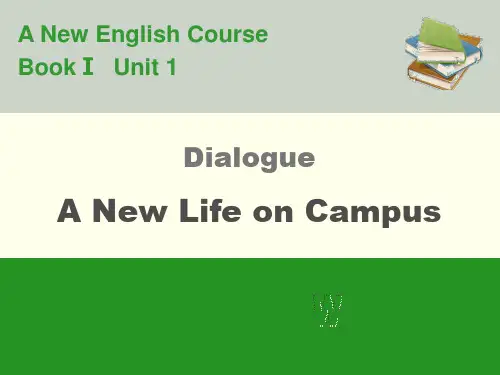
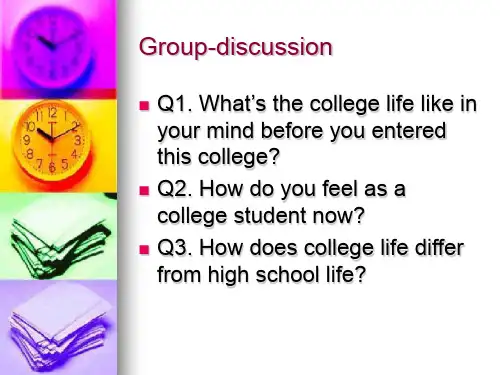
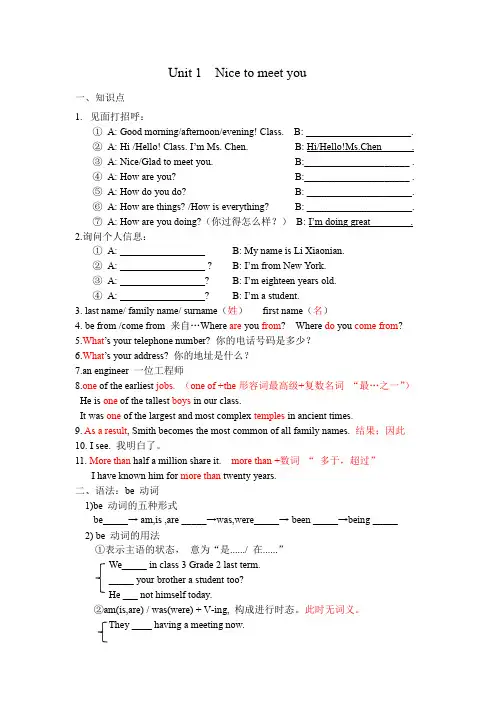
Unit 1 Nice to meet you一、知识点1.见面打招呼:①A: Good morning/afternoon/evening! Class. B: _____________________.②A: Hi /Hello! Class. I’m Ms. Chen. B: Hi/Hello!Ms.Chen .③A: Nice/Glad to meet you. B:_____________________ .④A: How are you? B:_____________________ .⑤A: How do you do? B: _____________________.⑥A: How are things? /How is everything? B: _____________________.⑦A: How are you doing?(你过得怎么样?)B: I’m doing great .2.询问个人信息:①A: _________________ B: My name is Li Xiaonian.②A: _________________ ?B: I’m from New York.③A: _________________?B: I’m eighteen years old.④A: _________________?B: I’m a student.3. last name/ family name/ surname(姓)first name(名)4. be from /come from 来自…Where are you from? Where do you come from?5.What’s your telephone number? 你的电话号码是多少?6.What’s your address? 你的地址是什么?7.an engineer 一位工程师8.one of the earliest jobs. (one of +the形容词最高级+复数名词“最…之一”)He is one of the tallest boys in our class.It was one of the largest and most complex temples in ancient times.9. As a result, Smith becomes the most common of all family names.结果;因此10. I see. 我明白了。
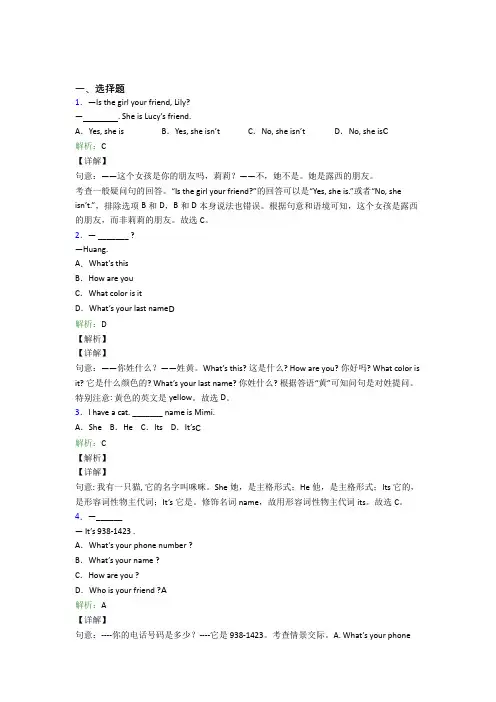
一、选择题1.—Is the girl your friend, Lily?—. She is Lucy’s friend.A.Yes, she is B.Yes, she isn’t C.No, she isn’t D.No, she is C解析:C【详解】句意:——这个女孩是你的朋友吗,莉莉?——不,她不是。
她是露西的朋友。
考查一般疑问句的回答。
“Is the girl your friend?”的回答可以是“Yes, she is.”或者“No, she isn’t.”,排除选项B和D,B和D本身说法也错误。
根据句意和语境可知,这个女孩是露西的朋友,而非莉莉的朋友。
故选C。
2.— _______ ?—Huang.A.What’s thisB.How are youC.What color is itD.What’s your last name D解析:D【解析】【详解】句意:——你姓什么?——姓黄。
What’s this? 这是什么? How are you? 你好吗? What color is it? 它是什么颜色的? What’s your last name? 你姓什么? 根据答语“黄”可知问句是对姓提问。
特别注意: 黄色的英文是yellow。
故选D。
3.I have a cat. _______ name is Mimi.A.She B.He C.Its D.It’s C解析:C【解析】【详解】句意: 我有一只猫, 它的名字叫咪咪。
She她,是主格形式;He他,是主格形式;Its它的,是形容词性物主代词;It’s它是。
修饰名词name,故用形容词性物主代词its。
故选C。
4.—______—It’s 938-1423 .A.What’s your phone number ?B.What’s your name ?C.How are you ?D.Who is your friend ?A解析:A【详解】句意:----你的电话号码是多少?----它是938-1423。
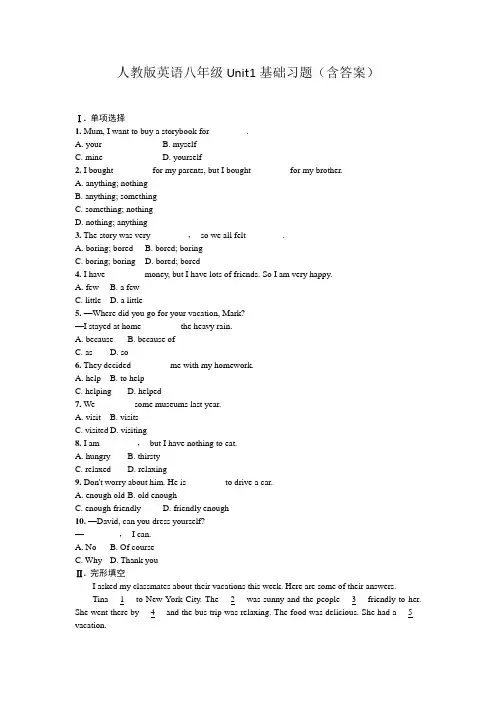
人教版英语八年级Unit1基础习题(含答案)Ⅰ. 单项选择1. Mum, I want to buy a storybook for ________.A. yourB. myselfC. mineD. yourself2. I bought ________ for my parents, but I bought ________ for my brother.A. anything; nothingB. anything; somethingC. something; nothingD. nothing; anything3. The story was very ________,so we all felt ________.A. boring; boredB. bored; boringC. boring; boringD. bored; bored4. I have ________ money, but I have lots of friends. So I am very happy.A. fewB. a fewC. littleD. a little5.—Where did you go for your vacation, Mark?—I stayed at home ________ the heavy rain.A. becauseB. because ofC. asD. so6. They decided ________ me with my homework.A. helpB. to helpC. helpingD. helped7. We ________ some museums last year.A. visitB. visitsC. visitedD. visiting8. I am ________,but I have nothing to eat.A. hungryB. thirstyC. relaxedD. relaxing9. Don't worry about him. He is ________ to drive a car.A. enough oldB. old enoughC. enough friendlyD. friendly enough10.—David, can you dress yourself?—________,I can.A. NoB. Of courseC. WhyD. Thank youⅡ. 完形填空I asked my classmates about their vacations this week. Here are some of their answers.Tina __1__ to New York City. The __2__ was sunny and the people __3__ friendly to her. She went there by __4__ and the bus trip was relaxing. The food was delicious. She had a __5__ vacation.Sally went to __6__ her uncle. Because the weather was windy and __7__,she had to stay at the house. She watched TV __8__ the TV shows were boring. She went shopping with her cousin but the shop assistants were __9__. She had a terrible vacation.Tom stayed at home. At first he did his homework. It was a little difficult. Then he __10__ computer games. They were interesting. He thought his vacation was OK.1. A. go B. goes C. went D. going2. A. place B. weather C. museum D. beach3. A. were B. was C. is D. are4. A. bike B. train C. plane D. bus5. A. bad B. terrible C. great D. boring6. A. visit B. visited C. look D. read7. A. rain B. rainy C. sun D. snow8. A. but B. and C. or D. with9. A. friend B. unfriend C. friendly D. unfriendly10. A. play B. played C. listened D. wroteⅢ. 阅读理解AKim went to a beautiful beach on Monday with his friends. It was sunny and hot. So they had great fun playing in the water. In the afternoon, they went shopping,but the shops were crowded. They didn't really enjoy it.The next day, it was rainy, so they went to a museum. It was boring. Kim found a small boy crying in the corner. The boy was lost. He helped the boy find his father. Kim was very happy. But he had no money for a taxi. So he had to walk back to the hotel. That made him feel very tired.On Wednesday, the weather was very cool. So they played tennis. They played all the morning. It was really fun.根据短文内容,判断下列句子的正误,正确的用“T”,错误的用“F”。
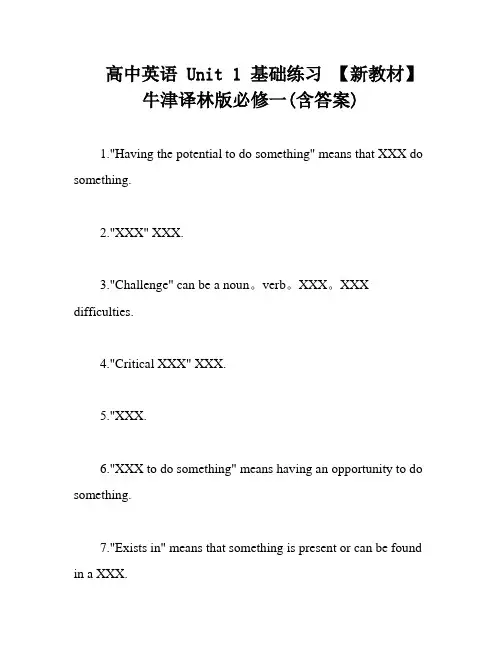
高中英语 Unit 1 基础练习【新教材】牛津译林版必修一(含答案)1."Having the potential to do something" means that XXX do something.2."XXX" XXX.3."Challenge" can be a noun。
verb。
XXX。
XXX difficulties.4."Critical XXX" XXX.5."XXX.6."XXX to do something" means having an opportunity to do something.7."Exists in" means that something is present or can be found in a XXX.8."Being able to handle" means having the ability to manage or deal with something.9."Acquiring knowledge" XXX n or learning something new.10."To do something diligently" means to work hard and not give up on something.11."Advance" can be a noun or verb that means to move forward or progress。
or a XXX.12."Amazing" can be an adjective。
adverb or verb that means something is impressive。
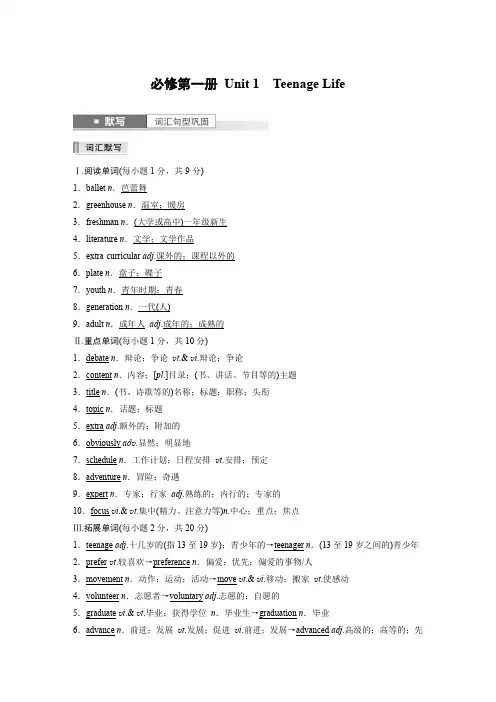
必修第一册Unit 1Teenage LifeⅠ.阅读单词(每小题1分,共9分)1.ballet n.芭蕾舞2.greenhouse n.温室;暖房3.freshman n.(大学或高中)一年级新生4.literature n.文学;文学作品5.extra-curricular adj.课外的;课程以外的6.plate n.盘子;碟子7.youth n.青年时期;青春8.generation n.一代(人)9.adult n.成年人adj.成年的;成熟的Ⅱ.重点单词(每小题1分,共10分)1.debate n.辩论;争论v t.& v i.辩论;争论2.content n.内容;[pl.]目录;(书、讲话、节目等的)主题3.title n.(书、诗歌等的)名称;标题;职称;头衔4.topic n.话题;标题5.extra adj.额外的;附加的6.obviously ad v.显然;明显地7.schedule n.工作计划;日程安排v t.安排;预定8.adventure n.冒险;奇遇9.expert n.专家;行家adj.熟练的;内行的;专家的10.focus v i.& v t.集中(精力、注意力等)n.中心;重点;焦点Ⅲ.拓展单词(每小题2分,共20分)1.teenage adj.十几岁的(指13至19岁);青少年的→teenager n.(13至19岁之间的)青少年2.prefer v t.较喜欢→preference n.偏爱;优先;偏爱的事物/人3.movement n.动作;运动;活动→move v t.& v i.移动;搬家v t.使感动4.volunteer n.志愿者→voluntary adj.志愿的;自愿的5.graduate v i.& v t.毕业;获得学位n.毕业生→graduation n.毕业6.advance n.前进;发展v t.发展;促进v i.前进;发展→advanced adj.高级的;高等的;先进的7.editor n.主编;编辑;编者→edit v t.编辑;剪辑→edition n.版本;版次8.survival n.生存;幸存;幸存事物→survive v i.& v t.幸存;比……活得长→survivor n.幸存者9.suitable adj.合适的;适用的→suit v t.适合;适宜于n.套装,西装10.solution n.解决办法;答案→solve v t.解决Ⅳ.高频词汇(每小题1分,共5分)1.accessible adj.易接近的;随和的2.accomplish v t.完成;实现3.accumulate v.积累;积聚4.accurate adj.精确的5.adaptation n.适应;改编Ⅴ.核心短语(每小题2分,共12分)1.suitable for对……适合的2.sign up (for sth)报名(参加课程)3.be responsible for对……负责4.be attracted to喜爱5.focus on集中;特别关注6.on one’s own独立地,独自地Ⅰ.词形变化填空(每小题2分,共20分)1.The good solution he came up with just now is good for solving the difficult problem.(solve) 2.Many people are confused about the confusing fact that the UK is made up of four confusion is difficult to solve.(confuse)3.Actually,looking at the actual numbers adds to our confusion.(actual)4.Hearing that her younger brother has become an addict who is addicted to drugs,Annie is very concerned about him for his addiction.(addict)5.The teacher reminded us to mind our behavio(u)r because some students behaved badly at the lecture.(behave)6.This attractive tourist attraction attracts numerous tourists every year.(attract)7.As a responsible person,I must shoulder my responsibility to help them responsibly.(responsible) 8.He strongly recommends me to read classics and his recommendation is of great benefit to me.(recommend)9.I gathered my courage and challenged him to a challenging game of chess.(challenge)10.I am fluent in is to say,I speak English fluently.Others admire my fluency in English.(fluent)Ⅱ.选词填空(每小题2分,共14分)prefer...to...,clean up,sign up for,be responsible for,focus on,hand out,be addicted to 1.Last month we worked at a soup kitchen and handed out food to homeless people in the community.2.I strongly suggest focusing on the contents of these articles instead of their writing styles. 3.After cleaning up the senior people’s rooms in the nursing house,we were exhausted but happy.4.Being addicted to reading online novels at night makes him feel sleepy in class,which makes his mother quite annoyed.5.If I am allowed to be responsible for the opening ceremony,I can’t thank you enough. 6.He preferred physics to English while English was my favorite subject.7.Why not sign up for the meaningful extra-curricular activity to be held in the lecture hall next Sunday?Ⅲ.经典句型仿写(每小题2分,共10分)1.老师建议他的学生要集中精力学习。
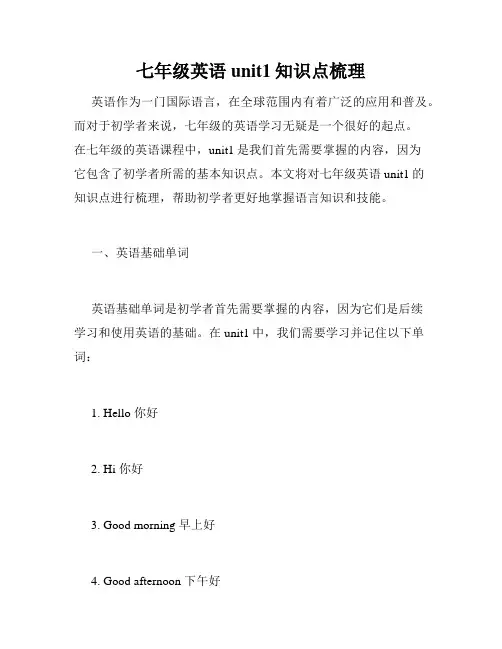
七年级英语unit1知识点梳理英语作为一门国际语言,在全球范围内有着广泛的应用和普及。
而对于初学者来说,七年级的英语学习无疑是一个很好的起点。
在七年级的英语课程中,unit1是我们首先需要掌握的内容,因为它包含了初学者所需的基本知识点。
本文将对七年级英语unit1的知识点进行梳理,帮助初学者更好地掌握语言知识和技能。
一、英语基础单词英语基础单词是初学者首先需要掌握的内容,因为它们是后续学习和使用英语的基础。
在unit1中,我们需要学习并记住以下单词:1. Hello 你好2. Hi 你好3. Good morning 早上好4. Good afternoon 下午好5. Good evening 晚上好6. Goodbye 再见7. Thanks / thank you 谢谢8. Please 请9. Yes 是10. No 不是除此之外,还有一些基本的数字、颜色等需要记忆,例如:11. One 一12. Two 二13. Three 三14. Red 红色15. Green 绿色16. Blue 蓝色17. Yellow 黄色二、形容词和副词的用法形容词和副词是英语中常用的词汇。
在unit1中,我们需要学习它们的用法,从而能够正确地描述事物、情感等。
下面列举一些常见的形容词和副词,以及它们的用法:1. Happy 快乐的例如:I am very happy today. 我今天非常快乐。
2. Sad 悲伤的例如:She is sad because she lost her wallet. 她因为丢了钱包而感到悲伤。
3. Small 小的例如:That is a small cat. 那是一只小猫。
4. Big 大的例如:The elephant is very big. 那只大象非常大。
5. Slow 慢的例如:He speaks English very slowly. 他说英语非常慢。
6. Fast 快的例如:She runs very fast. 她跑得很快。
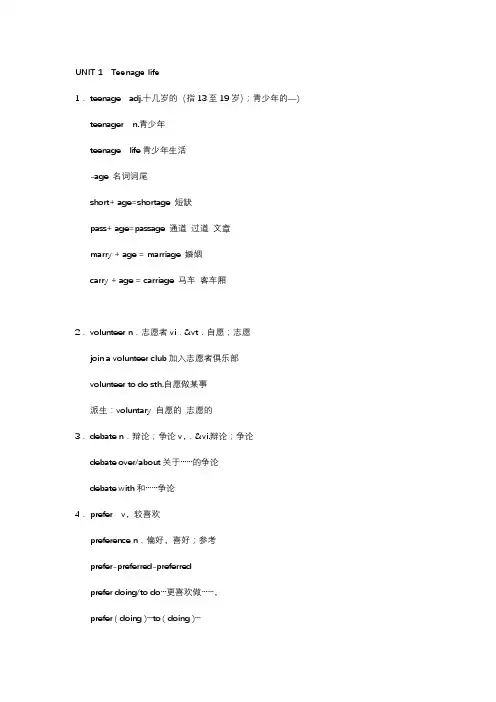
UNIT 1 Teenage life1.teenage adj.十几岁的(指13至19岁);青少年的—) teenager n.青少年teenage life青少年生活-age 名词词尾short+ age=shortage 短缺pass+ age=passage 通道过道文章marry + age = marriage 婚姻carry + age = carriage 马车客车厢2.volunteer n.志愿者vi.&vt.自愿;志愿join a volunteer club加入志愿者俱乐部volunteer to do sth.自愿做某事派生:voluntary 自愿的志愿的3.debate n.辩论;争论v,.&vi.辩论;争论debate over/about关于……的争论debate with和……争论4.prefer v,较喜欢preference n.偏好,喜好;参考prefer-preferred-preferredprefer doing/to do…更喜欢做……,p refer ( doing )…to ( doing )…prefer to do rather than do 宁愿 ..而不…5.content n,内容;目录;书、讲话、节目等的,主题adj. 满意的be content with 对… 满意6.actually adv.事实上;的确=as a matter of fact / in fact7.challenge n,挑战;艰巨任v.怀疑;向…,挑战;challenging adj.富有挑战性的challenged 受到挑战的face/meet a challenge面临/迎接挑战challenge sb. to sth.向某人挑战某事8.topic n.话题;标题9.confuse vt.使糊涂;使迷惑confusing adj.难以理解的;不清楚的一confused adj.糊涂的;迷惑的confusion n. 困惑10. movement n.动作;运动:活动11. suitable adj.合适的;适用的suitable to use适合使用be suitable for 对…合适suit v.适合(通常指款式、颜色等适合)12.fluent adj.尤指外语,流利的;熟练的fluent English流利的英派生:fluency n.流利13. graduate vi.&vt.毕业;获得学位n.毕业生斗graduation n. 毕业graduate from从某学校毕业graduate in从某专业毕业14. recommend v建议;推荐;介绍recommend doing建议做某事recommend sth. to sb.向某人推荐某物派生:recommendation n. 推荐15. advance n.前进;发展v.前进;发展;促进advanced adj.高级的;高等的;先进的,晚期的advanced course高级课程in advance提前,预先16. extra adj.额外的;附加的派生:extra + ordinary = extraordinary 不寻常的非法的extra + curriculum = extracurriculum 课外的业余的17. obvious adj.明显的obviously adv.显然;明显地I t’s obvious that…很明显……18. quit v. &vt.( quit,quit)停止;戒掉;离开工作职位q uit one’s job辞职quit school辍学quit doing sth.放弃做某事19. responsible adj.负责的;有责任的responsibility.责任;义务be responsible for对……负责i t’s one’s responsibility to do做某事是某人的职责take responsibility for为……担责任20.solution解决办法;答案a solution to …的解决办法find/come up with a solution发现/想出解决办法21. schedule n. 工作计划日程安排vt. 安排have different class schedules有不同的课程表ahead of schedule/behind schedule先于/迟于预定时冈be scheduled for预定……,排定be scheduled to do sth.计划做某事22. expert.专家;行家adj.熟练的;内行的;专家的an expert on……方面的专家be expert in擅长…23. behavior.行为;举止派生; behave v. 表现24. generation n,-代(人)future generations子孙后代the younger/older generation年轻一代/年老一代from generation to generation一代一代地generation gap 代沟25. attract v.吸引;引起……的注意(或兴趣attraction n,喜欢,爱慕;有魅力的人或物attract sb. to sth.把某人吸引到某物上attract attention/interest吸引注意力/引起兴趣派生:attractive 吸引人的distract 使…分心26. focus vt,.&vt.集中(精力、注意力等)调节焦距。
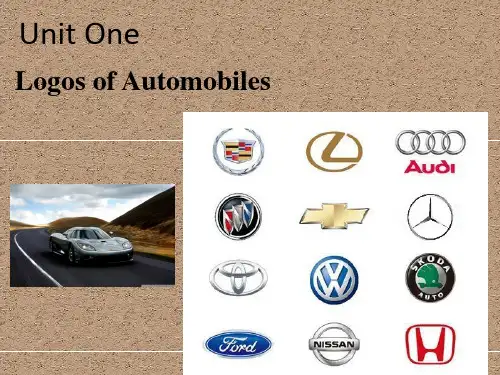
精品基础教育教学资料,仅供参考,需要可下载使用!Unit 1 How can we become good learners?第1课时Section A(1a2d)aloud adv.大声地;出声地pronunciation n.发音;读音。
其动词形式为pronouncepatient adj. 有耐心的。
n. 病人。
其反义词为impatient 【拓展】(1)aloud, loud和loudly都意为“大声地”,但用法有区别。
①aloud 强调能让人听得见。
常与动词read, call等连用。
如:Read aloud so that we can all hear you. 大点声读,以便我们大家都能听见你。
②loud 强调声音响亮。
常与动词speak, talk, say, laugh等连用。
常用比较级形式。
如:Facts speak louder than words. 事实胜于雄辩。
③loudly 有时可与loud通用,但含有“喧闹”或者“嘈杂”的意味。
如:Don't talk so loudly. 别这么高声说话。
(2)patient的常用短语:be patient with sb. 对某人有耐心;be patient to do sth. 有耐心做某事;be patient of…能忍受/容忍……have conversations with 和……交谈finish doing sth. 完成做某事give a report 做报告word by word 逐字/词地☆It's too hard to understand spoken English.理解英语口语太难了。
“It is+adj.+to do sth.”结构,it在句中作形式主语,真正的主语是动词不定式的内容。
如:He speaks in a low voice. It's too hard to hear him clearly. 他说话声音很低,太难听清楚他说什么了。
4000基础英语词汇背诵Unit1展开全文Unit 1 (20词+1故事)01afraidadj. 害怕的When someone is afraid, they feel fear.感到恐惧的。
→ The woman was afraid of what she saw.这个女人被自己的所见所闻吓到了。
02agreev. 同意To agree is to say 'yes' or to think the same way.表示赞同或想法一致。
→ A: The food is very good in thatrestaurant. B: I agree with you.A: 这家餐厅的食物真不错。
B:我也这么觉得。
03angryadj. 生气的When someone is angry, they may want to speak loudly or fight.人生气时可能会想大声说话或打架。
→ She didn't do her homework, so herfather is angry.她没做作业,这可把她爸爸气坏了。
04arrivev.到达To arrive is to get to or reach some place.去到或来到某个地方。
→ The bus always arrives at the cornerof my street at 4:00.班车通常在4点就到街角了。
05attackv. 攻击To attack is to try to fight or to hurt.意图打架或伤害。
→ The man with the sword attacked the other man first.拿剑的人先动的手。
06bottomn. 底部The bottom is the lowest part.最低的地方。
→ The bottom of my shoe has a hole in it.我鞋底磨了个洞。
基础英语教程unit1餐桌礼仪课文餐桌礼仪在中西方人民的完整生活秩序中占据非常重要的地位,用餐不仅仅是满足个人基本生理需要的方式,也是头等重要的社交经验。
我想预定桌位。
I'd like to make a reservation, please.如何预定餐位:Please reserve a table for three.1. 请保留一张三个人的桌位。
2. I'd like to book a table for two.2. 我想订一个两人的座位。
3. Could I reserve a table for this Sunday at 5: 00 p.m.?3. 我想预定这个星期日下午5点的桌位。
能为我们推荐几个菜品吗?Could you recommend some dishes for us?请服务员推荐:What's the special for today?请问今天的特色菜是什么?服务员可能会说:1. Steak is the special for today.1. 牛排是今天的特色菜。
2. The roast Peking duck is at a sale today.2. 今天的北京烤鸭是特价的。
让长者最先入席。
Make the elders have a seat first.入座与餐前礼仪:1. Open the chair for the lady who sits on your right side.1. 为坐在你右侧的女士拉开椅子,让她入座。
2. Upfold the napkin and then fold it half before putting it on your legs.2. 打开餐巾,然后对叠放在大腿上。
如何摆放刀、叉、勺?How to place the knife, fork and spoon?用餐时注意事项:1. Spare your knife and fork on the plate if you want to have a rest.1. 如果想在用餐中休息一下,可把刀叉放在盘子的两侧。
七年级英语unit1知识点总结Unit1是英语课程中的开篇之作,此单元主要介绍了日常生活中必须要用到的一些英文表达,从而帮助学生建立英文思维并培养英语应用能力。
在这个单元中,学生将学习到一些基本的动词、名词、形容词、副词和代词,并掌握一些关于家庭成员、学校用品、时间表达、介绍自己等方面的常用语言表达方式。
下面是七年级英语Unit1知识点总结:一、动词在Unit1中,常用的动词有:be、have、like、study等,下面对这些动词在用法上的注意点进行详细说明:1. be 动词be动词是英语中最基础的动词之一,它的变化形式较多。
在英语句子中,be动词通常被用作:主语的连系动词、句子的谓语或从句的连词等。
具体而言,be动词的用法包括以下几种:(1)作为谓语:用于表达主语的状态或特征。
例如:My father is a teacher.(我爸爸是一名教师。
)(2)作为非谓语:通常用于表达一定的习惯或行为方式。
例如:I am used to getting up early in the morning.(我习惯早起。
)(3)作为连词:用于连接句子或名词。
例如:The book is mine.(这本书是我的。
)2. have 动词have动词是常用的实义动词,表示“拥有”、“持有”等意义。
在不同的句型、语态中,have动词的用法稍有不同,主要包括以下三种情况:(1)存在或拥有某种状态、性质。
例如:He has a big house.(他有一幢大房子。
)(2)表示某种动作、行为、经历等。
例如:I have finished my homework.(我已经完成了我的作业。
)(3)构成一些固定短语,表示某种动作或行为。
例如:have a headache(头痛)、have a break(休息一下)、have a good time(玩得开心)等。
3. like 动词like动词表示“喜欢”的意思,它可以单独作为动词,也可以加上动词的-ing形式作为宾语补足语,具体而言,其用法及注意点如下:(1)like作为动词时,它的主语通常是人,宾语可以是人或物。
初一英语上册一单元知识点Unit 1: Greetings and IntroductionsIn the first unit of the first semester of the English textbook for first-year middle school students, we will be learning about greetings and introductions. This unit focuses on essential vocabulary, phrases, and grammar structures that are commonly used in everyday conversations. Let's dive into the key points!1. Greetings:- Hello! / Hi!- Good morning! / Good afternoon! / Good evening!- How are you? / How are you doing?- Nice to meet you!- What's up? / What's new?2. Introductions:- My name is... / I'm...- Nice to meet you!- Where are you from?- How old are you?- This is my friend...3. Personal Information:- Name:- Age:- Gender:- Nationality:- Hobbies:- Favorite subjects:4. Classroom Language:- May I come in?- Can I borrow a pen, please?- Sorry, I'm late.- Here you are. / Thank you.5. Questions and Answers:- Where do you live?- What's your favorite color?- Do you like sports?- How many siblings do you have?- What do you want to be in the future?6. Numbers:- Cardinal numbers (1-100)- Ordinal numbers (1st-10th) 7. Verb "to be":- I am a student.- He is from Japan.- They are my classmates.8. Possessive Pronouns:- My, your, his, her, our, their 9. Demonstrative Pronouns:- This, that, these, those10. Daily Routines:- I wake up at...- I brush my teeth.- I have breakfast.- I go to school.11. Expressing Likes and Dislikes: - I like playing soccer.- I don't like studying.12. Describing Family Members: - My mother is tall.- My brother has black hair.Remember to practice these greetings and introductions regularly to improve your English speaking skills. Use them in daily conversations with your friends, classmates, and teachers. Understanding and mastering these essential knowledge points will lay a solid foundation for your further English language learning.Keep up the good work, and in the next unit, we will be exploring more exciting topics together!。
1.ExercisesTrue (T) or False (F)?1. The writer thought that the likelihood of him getting the job was not great though he was young and eager to do something useful.T2. The headmaster liked the young man at first sight.FThe headmaster did not like the young man when he went for an interview. He looked at him with surprised disapproval and, instead of showing welcome to the young man, he just grunted, which was an expression of irritation and displeasure3. The headmaster saw eye to eye with the writer as far as children’s games were concerned.FThey did not think alike. To the headmaster, games played an essential role in a boy’s education but the writer did not consider games to have so much importance to the boys.4. The writer was not happy about his having to teach algebra and geometry, but he did not mind having to walk a mile along the dusty road to the Park.T5. The young man was satisfied with the salary he would get.FThe young man would only get twelve pounds a week including lunch, which was by no means good pay. Of course the writer was not satisfied. However, before he could say anything about the poor pay, the headmaster had stood up and asked the young man to meet his wife.6. The writer did not feel unhappy at the idea of working under the headmaster’s wife.FThe writer thought it was something he could hardly bear. To him, for a young man to work under a woman would be shameful and would result in a loss of dignity and self-respect.Explain the following in your own words.1. Being very short of money and wanting to do something useful, I applied, fearing as I did so, that without a degree and with no experience of teaching my chances of landing the job were slim. Because I was in bad need of money and was eager to do something of use, I applied for the job. But at the same time that I did so, I was afraid that the possibility for me to get the job was very small because I didn’t have a university degree, nor did I have any teaching experience.2. ...three days later a letter arrived, summoning me to Croydon for an interview.… three days later I received a letter, asking me to go to Croydon to have an interview.3. He looked at me with an air of surprised disapproval, as a colonel might look at a private whose bootlaces were undone.He cast a look at me with the same surprise and dislike as a colonel would look at a soldier when his bootlaces came loose.4. The headmaster and I obviously had singularly little in common.Apparently the headmaster and I had no similar interests or beliefs.5. The teaching set-up appalled me.The way teaching was organized filled me with terror (or, I was shocked at the teachingarrangements).6. I should have to split the class up into three groups and teach them in turn at three different levels.I should have to divide the class into three groups of three different levels and teach them one after another.7. It was not so much having to tramp a mile along the dusty streets of Croydon, followed by a crocodile of small boys that I minded, but the fact that most of my friends would be enjoying leisure at that time.I felt troubled not because I had to walk for a mile along the dusty streets of Croydon, followed bya group of boys, but because at that time most of my friends would be having a good time and relaxing.8. The prospect of working under a woman constituted the ultimate indignity.The fact that I would have to work under a woman in future made me feel totally humiliated.Text IIComprehensionTrue (T) or False (F)1. Most people think that a job interview is a terrible experience.Key: T2. You’re often given a reason if you’re not hired after an interview.Key: FIf you don’t get the job, you’re rarely given any reason why.3. You should neither wear casual student clothing nor overdress yourself when going to aninterview.Key: T4. To demonstrate your ability to be politely sociable, you should initiate small talk before gettingdown to business.Key: FYou should follow the interviewer’s lead and should not initiate any small talk or drag it out.5. You should be frank and list all your flaws to the interviewer.Key: FYou’ll come across as more believable if you admit a flaw – but make it one that an employer might actually like.6. A thank-you note shortly after the interview is one more chance to help you make a goodimpression.Key: T1. Role-playAn InterviewSituation:Mr. Black, manager of an investment company, is in urgent need of a secretary. He is now interviewing Mary, who has applied for this post.Sentence frames that might be used by an interviewer:Can I have ...?Could you tell us ...?Have you any experience in ...?Do you know how to ...?How long …?2. Interaction ActivitiesMaking Preparations for an InterviewYou are thinking of gaining some experience by working as a tourist guide. Next week, you are going to be interviewed by Mr. Patterson, head of a travel agency.1. In order to make a good impression on the interviewer, discuss with your partner thefollowing questions:1) What should / shouldn’t you wear? Why/why not?2) How should / shouldn’t you behave? Why/why not?2. To be fully prepared, discuss with your partner what questions the interviewer is likely toprepared for an interview.2. Details that the interviewer is interested in:certificate of education / diploma / degrees / major field of studyforeign languageswork experience as an interpreter / a clerk / a secretary / a tourist guidelikes and dislikespersonal status (single or married) / children1. Précis WritingA. Guidelines for writing a précis:1. Read the original text carefully; and, if necessary, read it several times. Search for the main idea(s).2. Write down what are considered to be the key words and phrases.3. Determine which parts of the text are essential and which supply non-essential supplementary information.4. Discard those points that are considered redundant.5. Base the précis on the notes and the précis writer’s own interpretation of the main idea(s).B. A précis of My First Job1. Choose the opening sentence from among the following:1) I went to Croydon for an interview.2) I applied for my first job before I entered university because I was short of money.3) I was very young when I got my first job.2. My First Job was an unpleasant experience of the writer’s. First, it was the first time for himto get a job; second, he needed the money. So, from the beginning to the end, everything was unpleasant. To intensify the already unpleasant atmosphere, a little description of the dismal surroundings, the bleak schoolhouse, and the disagreeable headmaster are needed.C. The reference versionI applied for my first job before I entered university because I was short of money. The school where I applied for a job was ten miles away from where I lived and I was not sure if I could get the job. However, after a terrible journey I was so depressed that I no longer felt nervous. The Victorian schoolhouse stood amid fumes and dust by a busy main road. The headmaster was not at all scholarly, neither was the inside of the house academic looking. By and by I discovered that the headmaster and I had very little in common. He wanted me to teach twenty-four boys from seven to thirteen who were to be split up into three levels. I had to teacheverything including the subjects I abhorred. Furthermore, I had to work on Saturdays too. The pay was low. To top it all, I had to work under a woman, the headmaster’s wife, who was the real manager of the school.2. Paragraph WritingFor your referenceThe incidents in a narrative are usually told in the order in which they occurred. Therefore, the sentence I never met Aunt Helen until the day when Mother sent me over with a thermos flaskof chicken soup serves as the topic sentence, and the following are the details:- the purpose of going there- the description of Aunt Helen- the pleasant atmosphere- the writer’s impressionAll these details adhere to the topic sentence to make the paragraph complete.Exercise I1. Spelling1. advertise2. suburb3. range4. interview5. quarter6. depress7. dreary8. indignity9. disapproval10. geometry11. singularly12. leisure2. DictationThe most important day I remember in all my life is the one on which my teacher, Anne Sullivan, came to me. It was the third of March, 1887, three months before I was seven years old. On the afternoon of that eventful day, I stood on the porch, dumb, expectant, I guessed from my mother’s signs and from the hurrying in the house that something unusual was about to happen, so I went to the door and waited on the steps. Hanging down from the porch was sweet-smelling honeysuckle. My fingers lightly touched the familiar leaves and blossoms which had just come forth to greet the sweet southern spring. I did not know what surprise the future held for me.I felt approaching footsteps. I stretched out my hand as I supposed to my mother. Someone took it, and I was caught up and held close in the arms of her who had come to help me discoverall things to me, and, more than anything thing else, to love me.3. Listening ComprehensionA. True (T) or False (F)?For false statements, write the facts.1. Henry would have liked his interview to begin at once.T2. The secretary waited in the manager’s office while the manager signed the letters.FThe manager signed the last letter and then rang the bell for his secretary to come in and take the letters away.3. The technical journals were very carefully arranged on the top shelf.FIt looked as if the technical journals might at any moment slip off the shelf and fall to the ground.4. The manager’s desk was very tidy.T5. The manager had no idea what job Henry had come for.FThe manager knew what job Henry had come for; he said, “You’ve come about our advertisement for a clerk in the accounts section, haven’t you?”B. Complete the following sentences with relevant information from the passage.1. The telephone rang just as the manager was explaining that that he was waiting for a long-distance call from Manchester.2. The manager apologized for keeping Henry waiting.3. The bookcase was so large that it covered the greater part of one wall.4. In the box which marked OUT, the manager dropped the letters which he had signed.Script:The InterviewThe manager waved his hand towards the chair on the other side of the desk and told Henry to take a seat. “I’m waiting for a long-distance call from Manchester,” he explained. The telephone rang just as he spoke. The manager picked up the receiver and for some minutes spoke rapidly and impatiently into the telephone. Henry waited, rather regretting that this interview, which he had been dreading for days, had not begun at once. When at last the manager had finished, a secretary came in with a pile of letters. “I really won’t keep you waiting much longer,” said the manager apologetically, as he picked up the first letter and began to read it. “But these have to catch the next post.”Henry passed the time by examining the manager’s office in some detail. On his right there was a large window, heavily curtained, with a view of the factory yard. Henry could see two workmen pushing a trolley across it towards a shed at the far end. Close to the window there werethree chairs arranged around a long, low table, on which stood a jug of water and some glasses. To Henry’s left there was a bookcase, which covered the greater part of one wall. The shelves were empty except for a dozen or so reference books, a pile of technical journals, which looked as if they might at any moment slip off the shelf and fall to the ground, and on the top shelf, standing by itself and looking rather out of place in the manager’s office, was a child’s plastic toy. Henry could not help wondering how it came to be there.The most impressive piece of furniture in the room was the manager’s desk. Everything on its spacious polished top was arranged with great neatness. On either side of the desk there were two metal trays, one marked IN, the other marked OUT. In the latter tray the manager dropped the letters which he had just signed.Henry had finished his survey of the room when the manager signed the last letter and tossed it into the tray on his right. “That’s the lot,” he said, as he rang the bell for his secretary to come in and take the letters away. Then he took off his glasses and rubbed his eyes. “Now let me see,” he said. “You’ve come about our advertisement for a clerk in the accounts section, haven’t you?”Henry nodded. His interview had begun.4. TranslationA. Translate the following sentences from Chinese into English.1.他们都认为他成功的可能性很小。